Living and Learning: I know the importance of consent (online and offline)
Consent – permission for something to happen/to agree to do something
Boundary – taking ownership of your own body/mind and setting limits
This week, Year 3 are looking into the importance of consent and boundaries, both online and offline. In our circle time, we are looking into a fantastic book about boundaries, and how you are the ruler of your own body and mind. We want all children to feel comfortable setting their own limits, and to also be respectful of the boundaries for other people. The children understand that boundaries for some people might be different and that we must respect that, even if our boundaries are not the same.
Next week, we will be looking into how boundaries and consent are important when online, too.

Help at home:
Talk with your child about setting boundaries and asking others for consent. Make sure your child is comfortable talking about, responding to and reporting anything that doesn’t make them feel happy and healthy.
Science – Habitats
In science, we’re biologists! We’re learning about animals and their habitats.
This week, we’ve learned about polar habitats and desert habitats, using secondary sources to conduct research and create some animal fact files.



Help at home by exploring some animal facts. The National Geographic Kids website is fantastic!
Reception parent/carer survey
At St James’ Primary School, we’re always keen to hear your views. We hope that you let us know any questions, comments and concerns (as well as causes for celebration!) whenever these crop up, but we like to gather the views more generally so we can keep reviewing and improving what we do.
This short survey is just for you to think about your child’s experiences in our Reception class. (There’s another annual survey at the end of the year for all parents/carers.) It’ll only take a few minutes or so. You’ve plenty of time to do this – the deadline is Friday 28 February 2025.
We can’t guarantee to meet the needs and wants of every parent / carer, but we do assure you that we consider all the points raised and aim to act on specific points that are raised by many, or a useful idea raised by just a few.
Previously, based on your feedback, for example, we alternated the days Stay and Learns were held – to give all parents an opportunity to attend.
Thank you for taking the time to complete the survey. We’re looking forward to reading your views.
We’ve been reading ‘Little Red Riding Hood’. If you have this story at home then please enjoy reading it together. If not, you might want to listen to Cbeebies sharing it for their story time.
Construction Champions- Our building skills have been amazing this week, we’re thinking about what we want to make and then using it in our play after. Look at these car ramps, hotels and even a passenger ferry.
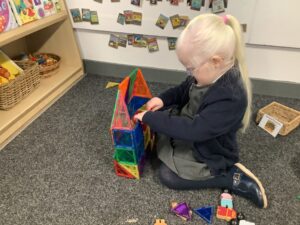
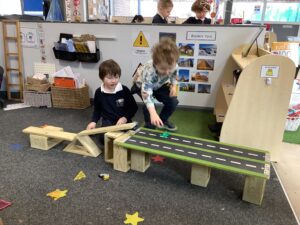
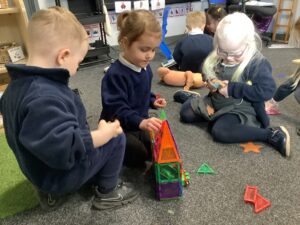
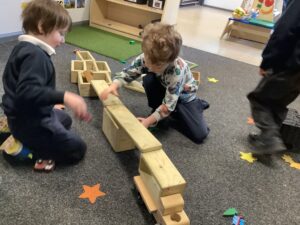
Mark making is such an important part of our learning in Nursery, we’ve been busy making marks in sand, painting, in our message centre and outside on the big whiteboard. We’re working really hard to hold our pencil comfortably so we have good control.
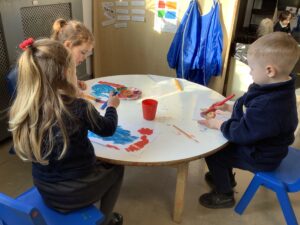
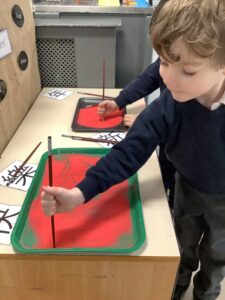
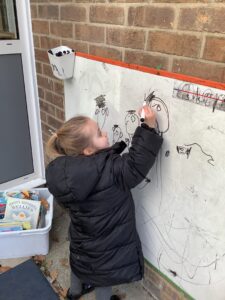
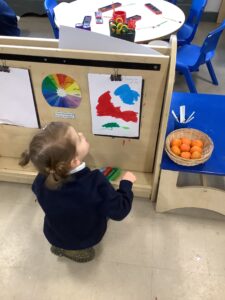
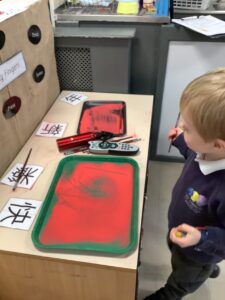
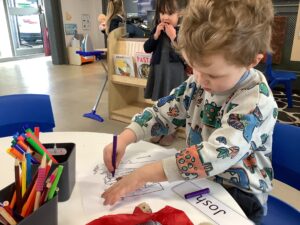
Help at home: We’re really enjoying our Nursery Rhymes, see if the children can perform you their favourite one. The Grand Old Duke of York, Baa Baa Black Sheep and 1,2,3,4,5 are the most requested.
Trip to MAGNA
We’re all really proud of how Year 4 enjoyed exploring the exhibits and learning about rocks and volcanoes at MAGNA this week. The children enjoyed exploring all the different pavillions but the water pavillion was their particular favourite.
Living and Learning – Internet Safety Workshop
Today, we were lucky to welcome Dave from d:side for an internet safety workshop.
Here are a few things we learnt:
- Lots of different devices can be used to access the internet, even fridges and kettles!
- 2 billion people around the world access the internet every day.
- Everyone can see what you upload to the internet.
- Not all videos on Youtube are suitable for all ages. Use YouTube Kids to stay safe.
- Games use number ratings to help us to know which games are suitable for our age.
Dave was really impressed by the children’s knowledge and made special mention to their focus and engagement. Well done, Year 2!
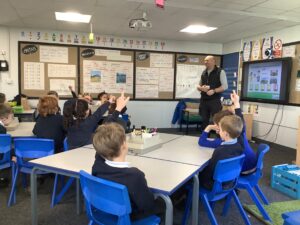

Help at home by discussing internet safety with your child. Do you have any rules for staying safe on the internet at home?
Living and Learning
Internet Safety with D:side Dave
D:side Dave was in school this morning, sharing some important messages about internet safety. The children really enjoy his sessions and always engage well. He began his session by asking children how old they should be to access many social media platforms. The age for this is 13.
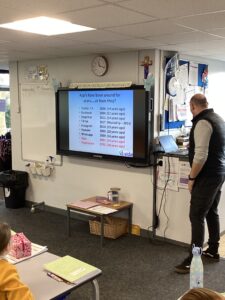
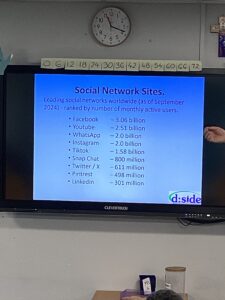
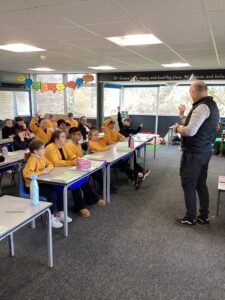

A key message from Dave is that internet safety is a partnership between the child and parents. We talked about these key points:
- Followers – when we receive a new friend request, we should ask ourselves – do I know them? If the answer is ‘no’, then we should decline. It is ok to decline requests and it is ok to delete followers once they have been added. We also need to consider if people online are telling the truth and they are who they say they are. Be careful when following older children – sometimes they post things which are not suitable for younger children. When following celebrities, make sure they are verified with a ‘tick’.
- Profiles should be made ‘private’.
- Always set passwords. Make sure these passwords are shared with parents. This builds trust between child and parent.
- Think carefully when posting images. Images can not be deleted once shared. You can delete from your phone but once shared with others, it is impossible to delete – this could cause problems in the future.
- If something appears to be too good to be true, it often is.
Help at home – read through this post with your child. Check that passwords are set and shared. Encourage transparency.
Times Tables Facts
If your child doesn’t know all of the times tables facts we have learnt in school so far, they’ve been given 2 facts to learn this week. It’d be great if you could ask your child what their facts are and quiz them on them over the week.
We will continue to do this for the rest of the year so any extra practise you can do at home would be great!
An unscheduled visit…
Last week, we explored our locality as part of our geography topic, conducting fieldwork to study the geography of our school and its surrounding environment.
As we reached the fire station to survey the traffic, recycling bins and litter, Mr Nash rang the doorbell…
Please can we have a look at your fire engine?
Moments later, the shutter opened and out drove the shiny, red fire engine!
The team at Wetherby Fire Station were so generous with their time, giving the children a tour of the vehicle and its tools, providing lots of opportunities to ask questions. The children really enjoyed the experience and asked some fantastic questions, representing our school fantastically with their impeccable manners.



Thank you to everyone at Wetherby Fire Station for being so accommodating with our unscheduled surprise visit. A lesson in “if you don’t ask, you don’t get.”…

Help at home by discussing what firefighters do to help in our community. Watch and discuss this video from West Yorkshire Fire and Rescue.
The Magic Paintbrush
This week our focus book has been The Magic Paintbrush by Julia Donaldson.

We talked about what we would paint if we had a magic paintbrush and wrote down our ideas.


We’ve be learning about Lunar New Year and have enjoyed making our own dragon in the workshop area that we showed in our whole school celebration assembly on Friday. We’ve also used our funky fingers to make snakes to mark the start of the year of the snake.

Poetry Picnic
Each week, we will be learning a new poem. We will recite this poem each day. By saying the poem out loud we can focus on the sounds and rhythm of each word or line. This week’s poem is A Little House.
I’m going to build a little house,
With windows big and bright,
And chimneys tall with curling smoke,
Drifting out of sight.
In winter when the snowflakes fall,
Or when I hear a storm,
I’ll go and sit in my little house,
Where I’ll be snug and warm.
We also recited this in our assembly and impressed the whole school with our wonderful prosody.
Phonics
Spring 1 week 2 has focused on our final sounds of phase 3: air, er
We’ve learnt the tricky words; are, sure, pure
Tricky words are words that should be read by sight
Have a happy and healthy week and thank you as always for your support.
Mrs. Kendrew, Mrs. Rippon, Mrs. Small and Mr. Smith.


